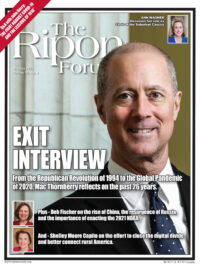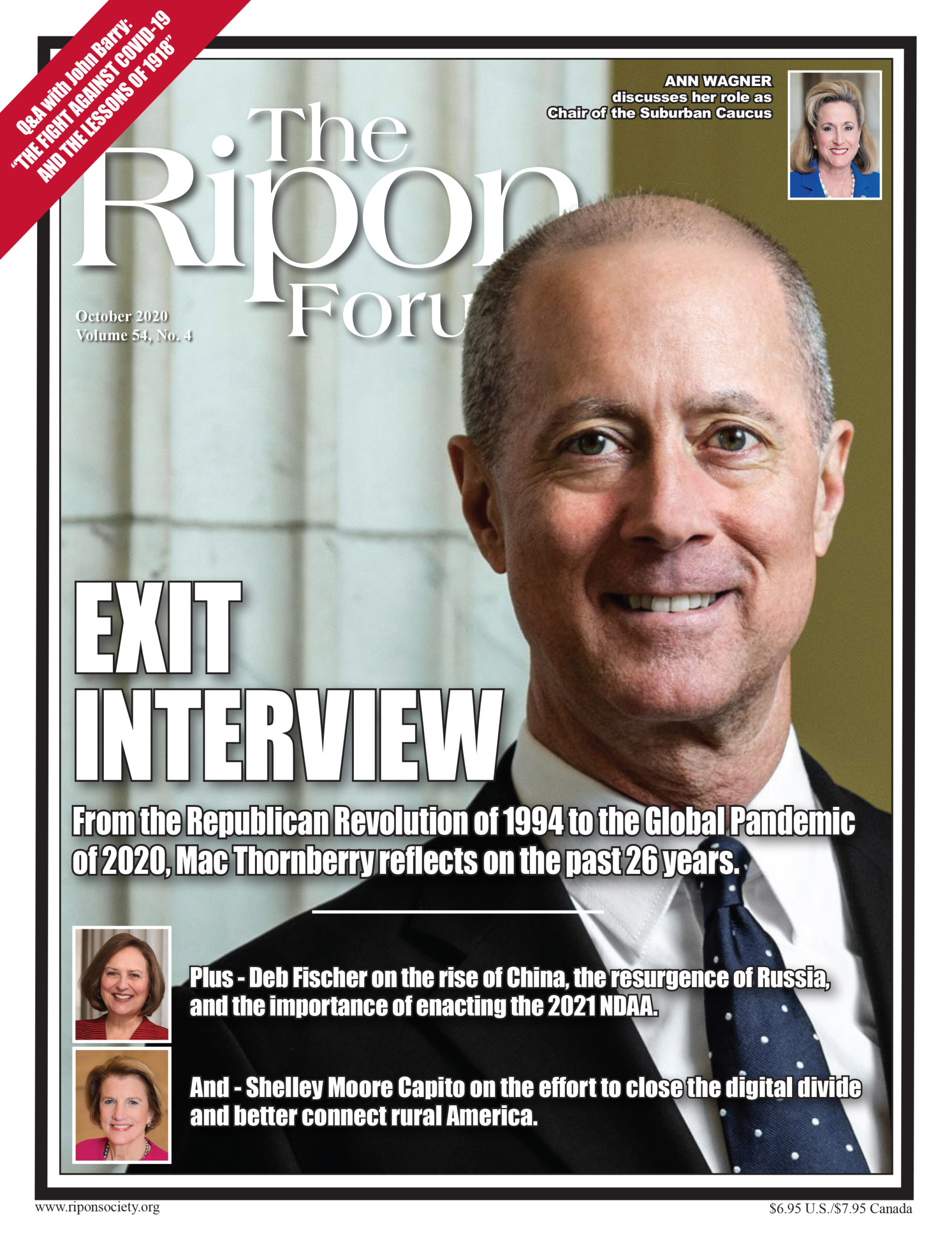“There are some things you don’t want to be right about.”
That was Mac Thornberry’s response when he was asked, in the days and weeks following the 9/11 terrorist attacks in 2001, how it felt to have introduced a bill to establish a Homeland Security Agency in March of that year, six months before the attacks occurred.
John Barry could very well say the same thing today. Barry is the author of “The Great Influenza: The Story of the Deadliest Pandemic in History.” Published in 2005, it tells the story of the deadly virus that swept across America and the world in the winter of 1918, killing as many as 100 million people around the globe.
Barry’s book is back on the bestseller’s list because many of the experiences — and mistakes — he wrote about are being repeated as America fights the coronavirus pandemic today. We talk to Barry in this latest edition of The Ripon Forum about this fight and the lessons that can be learned from the outbreak 102 years ago. “The virus is actually relatively easy to predict,” Barry said in our interview. “What you can’t really predict is human behavior.”
We also talk with Mac Thornberry himself, who is retiring from Congress after 26 years in office and is the focus of our cover story. Thornberry was elected as part of the Republican Revolution of 1994 and is departing during the global pandemic of 2020. In between these two events, the Texas lawmaker saw — and helped shape — a number of other historic moments, the most significant of which, he says, was 9/11 and the ensuing effort to wage a war against terrorism overseas. “I’m absolutely convinced,” Thornberry says of this effort, “that if we had not taken the fight to the terrorists and kept on offense, that there would have been more 9/11s, and they may have been far worse.”
Of course, the United States continues to face a threat from terrorism today. But an equally and in some ways even more daunting challenge that Thornberry and other key lawmakers are confronting these days is the rise of China and the resurgence of Russia. One of those lawmakers is Nebraska Senator Deb Fischer. Fischer serves as Chair of the Senate Armed Services Subcommittee on Strategic Forces. In this role, she has helped author the 2021 National Defense Authorization Act, a measure that would not only continue the effort to rebuild our military after years of neglect, but reaffirm the notion that America should continue to be the preeminent power around the world. According to Fischer, it is a notion that has support on both sides of the political aisle. “The idea that America, not Russia or China, should play the leading role in world affairs is bipartisan,” she writes in an essay for this latest edition. “The Senate NDAA does more than any other bill in recent memory to promote U.S. leadership.”
In addition to Thornberry and Fischer, this edition of the Forum also contains a number of other leading experts assessing some of the challenges facing the U.S. around the globe, including: Andrew Michta, writing about the transatlantic relationship and why European rearmament is so important to countering the Russian threat; David Dollar, writing about China’s Belt and Road Initiative seven years after President Xi Jinping gave a speech outlining the program’s ambitious reach; Clark Packard, writing about the U.S.-China trade relationship and whether decoupling the two countries’ economies is the right approach; Rup Narayan Das, writing about the importance of America’s relationship with India; and, Jessica Trisko Darden, examining U.S. foreign policy after the pandemic and four challenges that will need to be addressed.
With regard to the continuing fight against COVID-19, U.S. Sen. Shelley Moore Capito of West Virginia pens an op-ed for this latest edition about closing the digital divide and the importance of making sure rural areas of the country are connected. And Lisa Howley looks at how the pandemic has made the opioid epidemic worse.
And in our latest Ripon Profile, Missouri Congresswoman Ann Wagner discusses her role as Chair of the Suburban Caucus and the comprehensive plan she is spearheading to address the needs and concerns of a part of the electorate that could prove crucial to GOP electoral success.
As always, we hope you enjoy this latest edition, and welcome any comments or questions you might have.
Lou Zickar
Editor of The Ripon Forum
louzickar@clu.ccw.mybluehost.me





